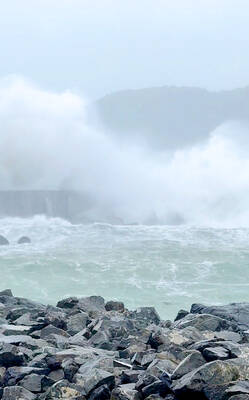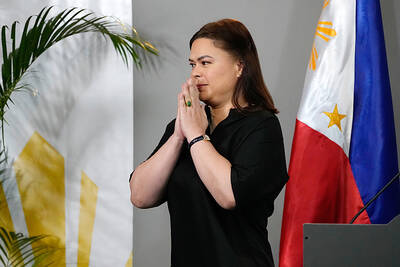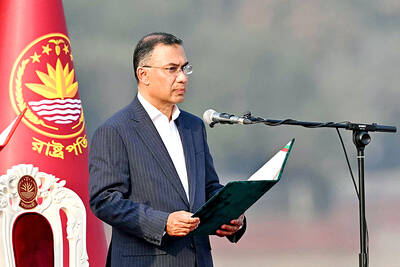Eighteen years after he was kidnapped by Mossad agents, nuclear whistleblower Mordechai Vanunu will go free this week -- a moment Israel fears will refocus unwelcome attention on its "bomb in the basement."
Anti-nuclear crusaders are flying in from Europe and the US for Wednesday's release, but they won't be able to embrace their hero.
Israel's security services, trying to quash celebrations and keep Vanunu silent, have barred him from speaking to foreigners, traveling abroad or even approaching foreign embassies for fear he might seek political asylum.
Vanunu, 50, said in remarks published yesterday that he has no more secrets to spill beyond what he told The Sunday Times of London in 1986 about his nine years as a technician at the Dimona nuclear reactor in the Negev Desert.
The US and Europe already know everything they need to know about Israel's nuclear program, Vanunu told Shin Bet interrogators two weeks ago, according to transcripts published in the Yediot Ahronot and Maariv dailies.
"As for myself, I just want to repeat the things I already said and that were published," Vanunu was quoted as saying.
Vanunu said he hoped there would be renewed debate about Israel's nuclear program and that the Dimona reactor should be destroyed, "like the reactor in Iraq was destroyed." Israel bombed the Iraqi reactor in 1981.
Based on Vanunu's descriptions and the photographs he secretly took inside the Dimona reactor, foreign experts said in 1986 that Israel had the world's sixth-largest stockpile of nuclear weapons. Such revelations undercut Israel's policy of "nuclear ambiguity."
That policy was forged in the 1960s when Israel promised the US it would not declare its nuclear status, test nuclear weapons or use them for political gain, wrote Israeli historian Avner Cohen on the Web site of the Bulletin of the Atomic Scientists, an academic journal in the US. In exchange, Washington did not pressure Israel to disarm.
Israel has kept the pledge, neither confirming nor denying it has nuclear capability. Some say that by drawing attention to its nuclear capability, Vanunu actually boosted Israel's security.
"There is no question that more than anybody, he (Vanunu) contributed to Israeli deterrence," Cohen said.
Vanunu is celebrated by anti-nuclear campaigners abroad. He received thousands of letters of support while in prison, was formally adopted by an elderly couple from Minnesota and had celebrities and members of the US Congress lobby on his behalf.
But there is little sympathy for him in Israel, a country where just about everything is debated openly -- except nuclear weapons.
Israelis believe the weapons are their last line of defense, "the ultimate guarantee that another Holocaust will not happen," said legal commentator Moshe Negbi. The consensus is that too much talk will only harm security.
Still, critics say, Vanunu's punishment was excessive, considering that he didn't reveal anything Israel's enemies didn't already suspect.
Those in charge of security at Dimona ignored many warning signs that Vanunu was drawn into left-wing and pacifist circles while still working at the reactor, said Yossi Melman, a journalist who writes about espionage.
Vanunu said Israel shouldn't have trusted him with sensitive information and that the "bigshot psychologists" from the Shin Bet and the Mossad security services should have spotted him as a potential security risk.
"You gave information to the wrong man," Maariv quoted him as saying. However, he insisted he was not a spy.
Vanunu was snatched from Rome by the Mossad in 1986 after being lured into a rendezvous by a female agent, smuggled to Israel by yacht, tried behind closed doors and sentenced to 18 years for treason. He spent 12 of those years in solitary confinement.
In the 30 months, Vanunu was under 24-hour video surveillance, with fluorescent lights on at all times in his windowless cell, said his brother Meir. He was allowed a one-hour daily walk in a yard shrouded in canvas to prevent him from signaling other prisoners. His only human contact was a guard and a family visit every two weeks.
Yediot and Maariv ran rare photographs of the white-haired, balding Vanunu yesterday, showing him in jeans, a brown prison uniform shirt and a blue ski jacket. Vanunu, a convert to Christianity, wore a gold cross around his neck and held a copy of the International Herald Tribune.
The prisoner, one of 11 children of working-class Jewish immigrants from Morocco, seems to have been an accidental spy.
He was a loner who rebelled against his ultra-Orthodox Jewish upbringing and searched for a place to belong. He studied at Ben Gurion University in the Negev while working at the reactor, joining pacifist and Arab-Jewish groups on campus, and earned an undergraduate degree in philosophy.
In 1985, after getting fired from Dimona, Vanunu flew to Thailand, where he stayed at a Buddhist monastery and considered conversion, then moved on to Australia. He became a Christian, changed his name to John Crossman, joined an Anglican congregation in Sydney and met a freelance journalist who suggested Vanunu talk to the media about Dimona. The Sunday Times was interested.
The Israeli government is trying to limit the damage caused by Vanunu's release by imposing restrictions on his movement, with the implicit threat of re-arrest if he violates them.
"We just want to stop him from spreading state secrets," said Likud Party legislator Yuval Steinitz, chairman of parliament's Defense and Foreign Affairs Committee.
"We think Vanunu still has information he hasn't revealed," Steinitz said.

Heavy rain and strong winds yesterday disrupted flights, trains and ferries, forcing the closure of roads across large parts of New Zealand’s North Island, while snapping power links to tens of thousands. Domestic media reported a few flights had resumed operating by afternoon from the airport in Wellington, the capital, although cancelations were still widespread after airport authorities said most morning flights were disrupted. Air New Zealand said it hoped to resume services when conditions ease later yesterday, after it paused operations at Wellington, Napier and Palmerston North airports. Online images showed flooded semi-rural neighborhoods, inundated homes, trees fallen on vehicles and collapsed

‘COST OF DEFECTION’: Duterte’s announcement could be an effort to keep allies in line with the promise of a return to power amid political uncertainty, an analyst said Philippine Vice President Sara Duterte yesterday announced she would run for president of the Southeast Asian nation of 116 million in 2028. Duterte, who is embroiled in a bitter feud with Philippine President Ferdinand Marcos Jr, was impeached last year only to see the country’s Supreme Court throw the case out over procedural issues. Her announcement comes just days before her father, former Philippine president Rodrigo Duterte, begins a pretrial hearing at the International Criminal Court (ICC) in the Netherlands over crimes against humanity allegedly committed as part of a brutal crackdown on drugs. “I offer my life, my strength and my future

NOT YET THERE: While the show was impressive, it failed to demonstrate their ability to move in unstructured environments, such as a factory floor, an expert said Dancing humanoid robots on Monday took center stage during the annual China Media Group’s Spring Festival Gala, China’s most-watched official television broadcast. They lunged and backflipped (landing on their knees), they spun around and jumped. Not one fell over. The display was impressive, but if robots can now dance and perform martial arts, what else can they do? Experts have mixed opinions, with some saying the robots had limitations and that the display should be viewed through a lens of state propaganda. Developed by several Chinese robotics firms, the robots performed a range of intricate stunts, including martial arts, comedy sketches and choreographed

POST-UPRISING: Bangladesh Nationalist Party lawmakers were yesterday expected to formally elect Tarique Rahman as their leader and new head of government Bangladesh’s prime minister-to-be Tarique Rahman and lawmakers were yesterday sworn into parliament, becoming the first elected representatives since a deadly 2024 uprising. Rahman is set to take over from an interim government that has steered the country of 170 million people for 18 months since the autocratic government of Sheikh Hasina was overthrown. The lawmakers, who promised loyalty to Bangladesh, were sworn in by Chief Election Commissioner AMM Nasir Uddin. Bangladesh Nationalist Party (BNP) lawmakers are expected to formally elect Rahman as their leader, with President Mohammed Shahabuddin then to administer the oath of office to the prime minister and his ministers